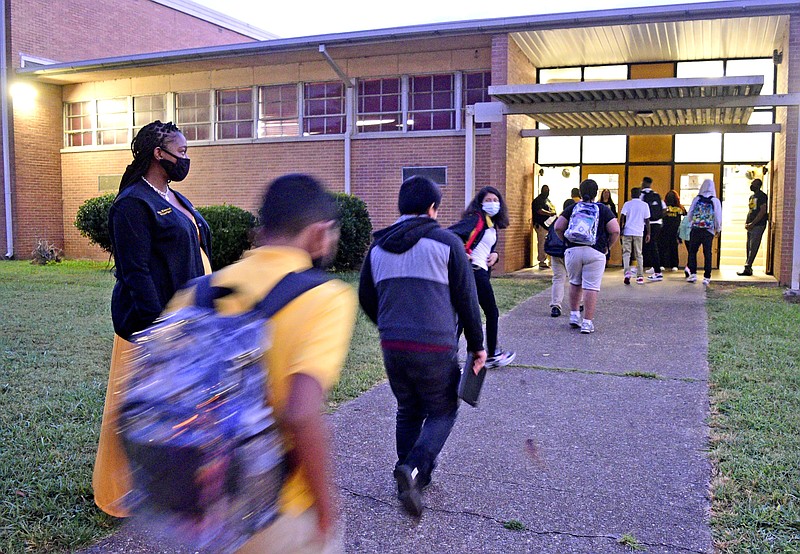The Hamilton County Board of Education likely will have a called meeting in the next few days to reverse a vote it took last week to oppose a state pilot program at Orchard Knob Middle School, board chairman Tucker McClendon confirmed Thursday.
The board had voted 6-2 to oppose the pilot, which is part of a program for five schools across the state mandated by the General Assembly during its session last spring. Members apparently also thought they knocked The Howard School out of receiving $750,000 in added support from the state. But, just in case, they voted 7-1 in a separate memorandum of understanding to accept the money for Howard.
In discussion before what was essentially a meaningless vote since the pilot program - approved by legislators - would occur anyway, board member Karitsa Jones said the school system was being used as "guinea pigs," member Jenny Hill said the state just wanted to come in and get a "quick win" at Orchard Knob because the school was ready to leave the state's priority schools list, member Marco Perez said "some would argue this is extortion," board member Joe Smith said it was "extortion," and board chairman Tucker McClendon said "it might not be the legal definition of extortion, but that's what it is."
However, Dr. Penny Schwinn, Tennessee's commissioner of education, said in letter obtained by the Times Free Press that the board was "misinformed" in a number of areas.
She refuted, for instance, that the state wanted to put Orchard Knob in the pilot program to gain credit for any success the school had if it escaped the state's priority schools list next fall.
"The state has a very limited role in the pilot," Schwinn wrote state Sen. Todd Gardenhire, R-Chattanooga, in a letter obtained by the newspaper through the Freedom of Information Act. "Our responsibility is to run a procurement to provide options for the district to select from ... and to allocate the money. After that, the state has no role and would take no credit, nor does it want to."
Further, she said, "the district makes 100% of the decisions for the pilot. There was a comment [in the board meeting] about state takeover and the state 'coming into our schools.' ... The district makes the plan. The district names the turnaround committee. The district picks the partner. The district makes the decisions. It is a completely locally owned process, once the schools are selected."
Schwinn also said there is no guarantee Orchard Knob Middle will leave the priority schools list (which it has been on since 2012), though it has shown growth in reading and math scores.
"Based on the exit criteria and other performance of schools in the state," she wrote, "Orchard Knob would have to grow a significant amount to be above the 15th percentile this year, more than doubling last year's increase."
Gardenhire, who along with state Sen. Bo Watson, R-Hixson, voted against the state pilot program last spring, said the adoption of the law does not give the district a choice. Or, rather, he said, the other choice is for the school to be put in the state-run Achievement School District (ASD).
Orchard Knob and four other schools were about to be placed in the ASD in 2017 just as now-former Superintendent Dr. Bryan Johnson arrived, he said. Gardenhire met with Johnson and other district officials, who didn't want to see the schools moved to state control, and agreed to "go to bat" for them.
In the end, instead of being put into the ASD, a locally driven pilot program was created to turn around the schools. However, the list of priority schools in the district did not shrink but eventually grew to nine, and now is at eight.
"I bent over backward for them," Gardenhire said. "That's not going to happen again."
McClendon, seemingly gleeful in the meeting for a confrontation with Schwinn about the Orchard Knob vote and potential money for Howard, now says he voted "no" because he wanted "as good a partnership as could be" between the state and the school.
He said Thursday he hadn't talked to Schwinn but that new Superintendent Justin Robertson was to have a meeting with her about the situation.
The commissioner of education, in her letter to Gardenhire, expressed hope the state's formerly good relationship with the school district soon would improve.
"[W]e want to work well with HCS (Hamilton County Schools)," she wrote, "and did under prior leadership ... While we understand that there may be ebbs and flows between the state agency tasked with implementing laws and some of that state's larger districts, it is unfortunate to see such a marked shift in HCS since mid-August. We are optimistic about the new superintendent and his vision for moving the district forward at the pace we've seen prior."
Clearly, communication must improve among the state, district administration, school board and its attorney. According to Gardenhire, the pilot should have been approved by the school board in August or September. That the board is still dealing with it in mid-December - and must again in a called meeting - speaks volumes.
We trust Robertson will be a catalyst for an improved dialogue, a supporter of any pilot that would help move a school out of the lowest 10% of schools in the state and a detailed oriented administrator who wouldn't allow the above situation to fester to the point it did last week.
